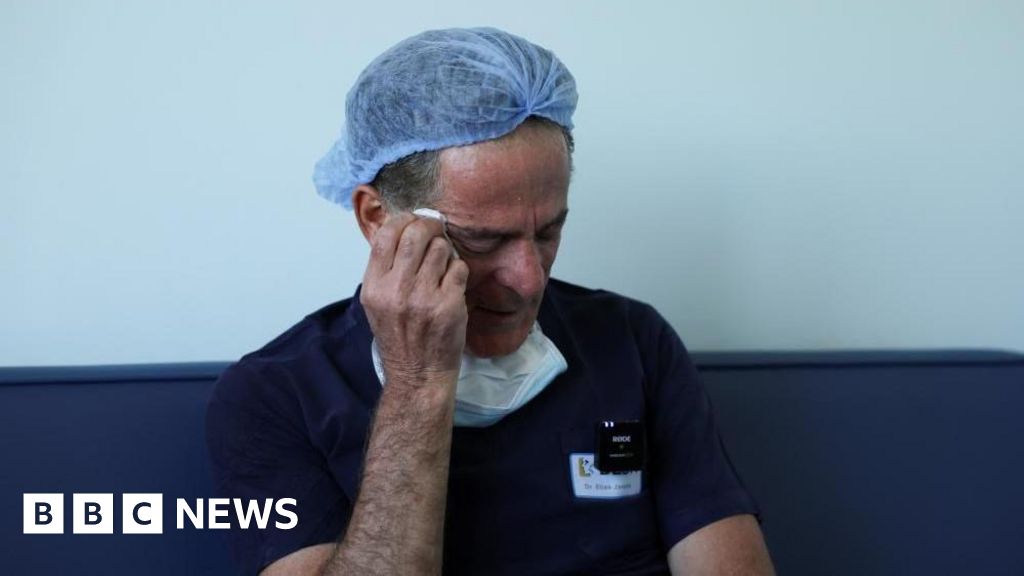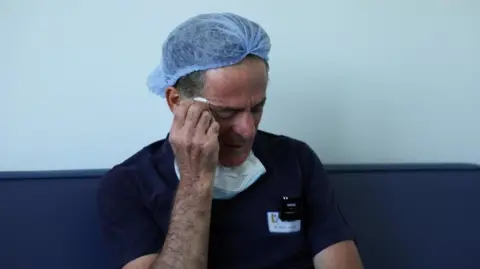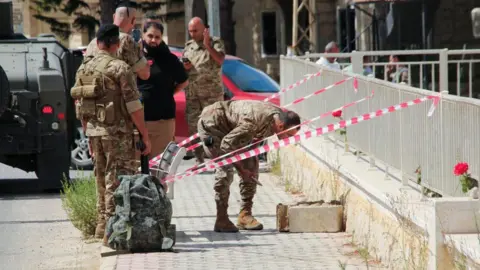
 Reuters
ReutersA Lebanese surgeon has described how the sheer volume of severe wounds from two days of exploding device attacks forced him to act “robotic” just to be able to keep working.
Surgeon Elias Jaradeh said he treated women and children but most of the patients he saw were young men. The surgeon said most of the patients he saw were “severely injured” and many had lost the sight in both eyes.
The dead and injured in Lebanon include fighters from Hezbollah – the Iranian backed armed group which has been trading cross-border fire with Israel for months and is classed as a terrorist organisation by the UK and the US.
But members of their families have also been killed or wounded, along with innocent bystanders. Elias Jaradeh described the wounded he treated as looking “mostly civilian”.
The bomb attacks – which killed 37 people including two children – have been widely blamed on Israel, which has not claimed responsibility.
Warning: This report contains graphic details
Dr Jaradeh, who is also an MP for the Change parliamentary bloc, was working at a specialist eye and ear hospital where some of the most severely wounded people were sent. He said it had taken a toll on the medical teams, himself included.
“And, yes, it’s very hard,” the surgeon said. “You have to dissociate yourself. More or less, you are robotic. This is the way you have to behave, but inside, you are deeply injured. You are seeing the nation injured.”
Surgeons like Dr Jaradeh worked for almost 24 hours continuously on the wounded, many of whom have lost their eyesight or the use of their hands, the country’s health minister told the BBC.
Eye specialist Prof Elias Warrak told BBC Arabic that in one night he extracted more damaged eyes than he had previously in his entire career.
“It was very hard,” he said. “Most of the patients were young men in their twenties and in some cases I had to remove both eyes. In my whole life I had not seen scenes similar to what I saw yesterday.”
Health Minister Firass Abiad told the BBC the victims’ injuries would prove life-changing.
“This is something that unfortunately will require a lot of rehabilitation,” he said.
About 3,200 people were injured, most of them in Tuesday’s attack which saw thousands of pagers detonated.
Wednesday’s attack, which detonated two-way radio devices, wounded about 450 people but was responsible for 25 deaths, twice as many as in Tuesday’s blasts.
Abiad told the BBC the attacks constituted a war crime.
“The whole world could see that these attacks occurred in markets,” he said.
“These were not people who were at the battleground fighting. They were in civilian areas with their families.”
Witnesses described seeing people with severe wounds to their faces and hands after the attacks.
Journalist Sally Abou al-Joud says she saw patients “covered in blood” at hospitals, where ambulances were arriving “one after the other within the minute”. Most injuries she saw were “in the faces and the eyes”.
“We’re talking about hands injured, severely injured fingers torn, I’ve heard some doctors say we need to perform amputation surgeries to remove hands… they need to perform surgeries for eyes to remove them,” she said.
One woman told BBC Arabic on Thursday that what they had seen was a “massacre in every sense of the world”.
“Young men were walking in the street with injuries to their hands, waist and eyes… they were unable to see anything,” she said.
In the aftermath of Tuesday’s blasts, writer and politician Tracy Chamoun said she saw one man with his eye blown out and another “had half of his face ripped off”. She had been driving in southern Beirut – a Hezbollah stronghold – at the time.
Many Lebanese in Beirut say the device attacks have reignited their trauma from the Beirut port explosion four years ago.
At least 200 people were killed and 5,000 injured when thousands of tonnes of ammonium nitrate stored unsafely at a warehouse in the port blew up, sending a mushroom cloud into the air and a supersonic blastwave tearing through the city.
“We remembered such painful scenes… it is something truly terrifying,” one woman told BBC Arabic. “A state of confusion, discomfort and anxiety is dominating all Lebanon… what happened to us four years ago is being repeated now.”
In the aftermath of the exploding pagers and radio devices the Lebanese army has been destroying suspicious devices with controlled detonations, while walkie-talkies and pagers have now been banned onboard all flights operating at Beirut’s Rafic Hariri Airport – the only operational commercial airport in Lebanon.
More than 90 of those injured are now in Iran receiving further treatment, according to Tehran’s embassy in Lebanon.
That includes Iran’s ambassador, Mojtaba Amani, whose condition has been described as “very good” by the embassy in its statement.
Officials didn’t elaborate on how serious the injuries suffered by the other transferees were.
Abiad said the “weaponisation of technology” was something very serious, he said, not only for Lebanon but also for the rest of the world, and for other conflicts.
“Now we have to think twice before using technology,” he said.
 Reuters
ReutersOn Thursday Hezbollah’s leader Hassan Nasrallah described the device attacks as a “massacre” and a “declaration of war” as Israel carried out air strikes on southern Lebanon and jets flew over the capital at low altitude, creating a deafening noise.
The Shia Muslim organisation is a major political presence and controls the most powerful armed force in Lebanon.
It has been trading near-daily cross border fire with Israel since Israel began its retaliation against Hamas in the Gaza Strip after the Palestinian group attacked southern Israel last October. Hezbollah says it is acting in solidarity with the Palestinians.
Israel has said it is changing its military focus to its border with Lebanon, with the aim of returning tens of thousands of displaced residents to their homes. Hezbollah has previously said it would stop firing if there is a ceasefire in Gaza.
Both Dr Jaradeh and Health Minister Abiad are pessimistic about the chances of peace any time soon. Dr Jaradeh described the escalation in Lebanon as a “rebound effect”.
“I think whatever happens, it doesn’t matter how you end up the world, but if you don’t reach a peace, permanent peace process, that protecting everyone and giving the right to everyone, so we are preparing to another war,” he said.
Abiad said Lebanon needed to prepare for the “worst-case scenario”.
“The two attacks in the last day, show that their intent (Israel) is not towards a diplomatic solution,” he said.
“What I know is the position of my government is clear. From day one, we believe that Lebanon does not want war.”
Additional reporting by Carine Torbey in Beirut

